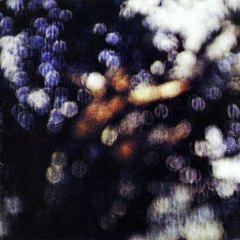Pink Floyd - Obscured By Clouds (1972)
Pink Floyd - Obscured By Clouds (1972)

01. Obscured By Clouds (Waters, Gilmour) - 3:05
02. When You're In (Waters, Gilmour, Mason, Wright) - 2:20
03. Burning Bridges (Wright, Waters) - 3:23
04. The Gold It's In The... (Waters, Gilmour) - 3:00
05. Wot's... Uh The Deal (Waters, Gilmour) - 5:02
06. Mudmen (Wright, Gilmour) - 4:14
07. Childhood's End (Gilmour) - 4:29
08. Free Four (Wright, Waters) - 4:08
09. Stay (Wright, Waters) - 4:01
10. Absolutely Curtains (Waters, Gilmour, Wright, Mason) - 5:51
Personnel:
- David Gilmour – guitars, vocals, VCS3
- Roger Waters – bass guitar, vocals, VCS3
- Richard Wright – keyboards, vocals, VCS3
- Nick Mason – drums, percussion
+Mapuga tribe – vocals on "Absolutely Curtains"
Obscured by Clouds is the soundtrack to the Barbet Schroeder film La Vallée, and it plays that way. Of course, it's possible to make the argument that Pink Floyd's music of the early '70s usually played as mood music, similar to film music, but it had structure and a progression. Here, the instrumentals float pleasantly, filled with interesting textures, yet they never seem to have much of a purpose. Often, they seem quite tied to their time, either in their spaciness or in the pastoral folkiness, two qualities that are better brought out on the full-fledged songs interspersed throughout the record. Typified by "Burning Bridges" and "Wot's...uh the Deal," these songs explore some of the same musical ground as those on Atom Heart Mother and Meddle, yet they are more concise and have a stronger structure. But the real noteworthy numbers are the surprisingly heavy blues-rocker "The Gold It's in The...," which, as good as it is, is trumped by the stately, ominous "Childhood's End" and the jaunty pop tune "Free Four," two songs whose obsessions with life, death, and the past clearly point toward Dark Side of the Moon. ("Childhood's End" also suggests Dark Side in its tone and arrangement.) As startlingly advanced as these last two songs are, they're not enough to push the rest of Obscured by Clouds past seeming just like a soundtrack, yet these tunes, blended with the sensibility of Meddle, suggest what Pink Floyd was about to develop into. ---Stephen Thomas Erlewine, allmusic.com
The title of Pink Floyd's debut album is taken from a chapter in Syd Barrett's favorite children's book, The Wind in the Willows, and the lyrical imagery of The Piper at the Gates of Dawn is indeed full of colorful, childlike, distinctly British whimsy, albeit filtered through the perceptive lens of LSD. Barrett's catchy, melodic acid pop songs are balanced with longer, more experimental pieces showcasing the group's instrumental freak-outs, often using themes of space travel as metaphors for hallucinogenic experiences -- "Astronomy Domine" is a poppier number in this vein, but tracks like "Interstellar Overdrive" are some of the earliest forays into what has been tagged space rock. But even though Barrett's lyrics and melodies are mostly playful and humorous, the band's music doesn't always bear out those sentiments -- in addition to Rick Wright's eerie organ work, dissonance, chromaticism, weird noises, and vocal sound effects are all employed at various instances, giving the impression of chaos and confusion lurking beneath the bright surface. The Piper at the Gates of Dawn successfully captures both sides of psychedelic experimentation -- the pleasures of expanding one's mind and perception, and an underlying threat of mental disorder and even lunacy; this duality makes Piper all the more compelling in light of Barrett's subsequent breakdown, and ranks it as one of the best psychedelic albums of all time. ---Steve Huey, allmusic.com
download (mp3 @320 kbs):
yandex mediafire mega ulozto cloudmailru gett
Last Updated (Wednesday, 31 October 2018 20:50)
